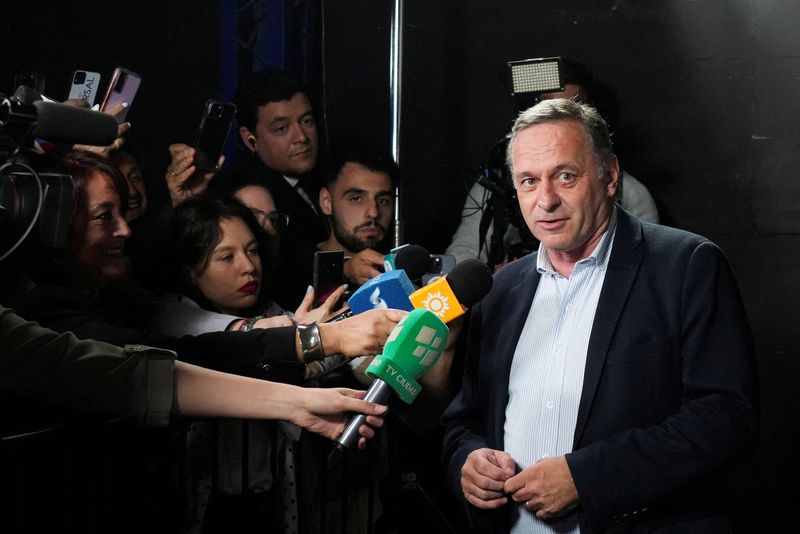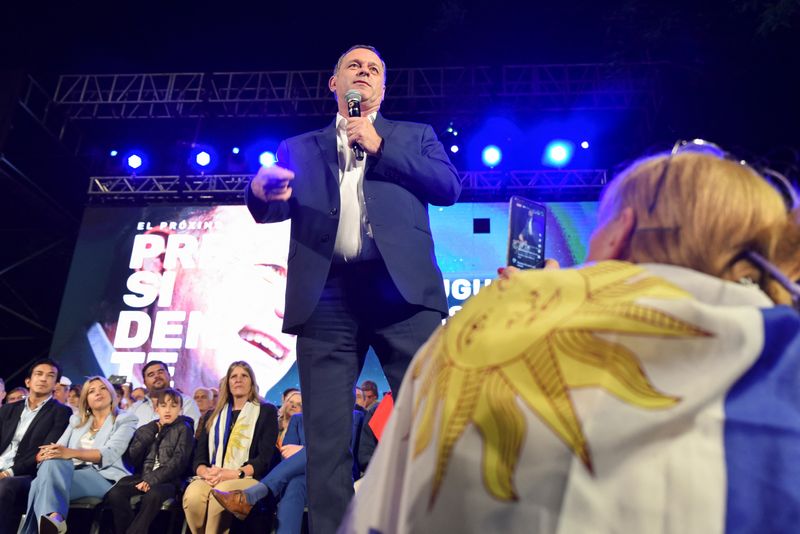By Lucinda Elliott
MONTEVIDEO (Reuters) - Uruguayan Alvaro Delgado, a 55-year-old former senator and the conservative ruling coalition's continuity candidate for president, is counting on support from an eliminated ally to triumph against the center-left frontrunner in Sunday's run-off election.
Delgado trained as a vet and until recently was Cabinet chief for President Luis Lacalle Pou. He will take on Yamandu Orsi in the Nov. 24 second-round race after neither secured more than 50% of the vote in the first round.
Delgado has asked voters to "re-elect a good government," seeking to capitalize on the popularity of Lacalle Pou, who constitutionally cannot run for immediate re-election.
Orsi got 43.9% of votes in the first round, and Delgado was some way behind on 26.8%. But third-placed candidate Andres Ojeda, who received 16%, has thrown his support behind Delgado.
Opinion polls show that Orsi remains in the lead, but that the combined conservative vote is only a few points behind him.
Ojeda told Reuters in an interview ahead of the election that his centrist Colorado Party was closely aligned politically with Delgado's National Party.
"We have each other's back," he said. "We will always be partners."
The 40-year-old Ojeda has told his supporters to back Delgado in order to block Orsi's center-left Broad Front from returning to power.
Delgado has played up his credentials as the continuity and stability candidate. He wants to push ahead with the current government's goals for free-trade deals, including with China, hold taxes down, and deepen a fight against organized crime.
"I want to be the president of certainties and of a Uruguay that advances. I want to be president to continue the course that began with our government," Delgado said from the campaign trail in the country's rural interior.
"What this government has done allows us to dream big and be more ambitious so that Uruguay takes a leap and becomes the most developed country in Latin America."
He wants more video surveillance and a larger police force to increase security, a key voter concern. He also needs to address accusations of corruption that have hit the government's popularity. A robust economy, however, is helping him.
SWAY THE UNDECIDED
Uruguay's former central bank chief Diego Labat, an ally and likely finance minister if Delgado wins, said the candidate had bags of experience and strong negotiating skills that meant he could build relationships across the political aisle.
"He's been behind all the big decisions during this administration," Labat said.
Political insiders described Delgado as a stickler for detail and pointed to his track record in government.
Voters cited his steadiness, but some said he lacked charisma and has not captured the public imagination in the same way Lacalle Pou did in 2019.
If elected, Delgado could struggle to govern without a majority in parliament.
Neither coalition has an absolute majority in the lower house following October's elections, but the Broad Front won 16 of 30 Senate seats.
"I'm personally in favor of forming a space for political coordination in which all parties are represented," Delgado said, adding that he hoped to "manage our differences" if elected.

Delgado's immediate challenge is to attract those who voted for his rivals, including the roughly 8% of first-round voters who went for smaller, unaligned parties, as well as Uruguayans who did not vote in October.
He also must upend a global trend as Uruguay closes a bumper 2024 election year: hurt by the rising cost of living, incumbent parties have lost seats or vote share from the last election in democracies around the world, including Britain, Japan and the United States.
